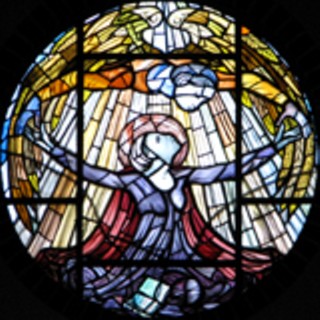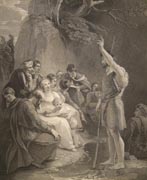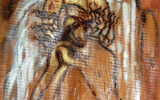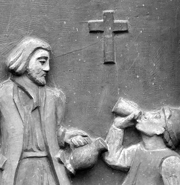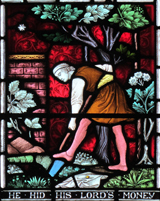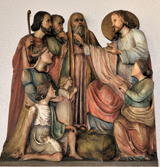First Sunday after Christmas Day
READINGS FOR THE COMING WEEK
- First reading
- Isaiah 61:10-62:3
- Psalm
- Psalm 148
- Second reading
- Galatians 4:4-7
- Gospel
- Luke 2:22-40
First reading from Isaiah
I will greatly rejoice in the LORD, my whole being shall exult in my God; for he has clothed me with the garments of salvation, he has covered me with the robe of righteousness, as a bridegroom decks himself with a garland, and as a bride adorns herself with her jewels.
For as the earth brings forth its shoots, and as a garden causes what is sown in it to spring up, so the Lord GOD will cause righteousness and praise to spring up before all the nations.
For Zion’s sake I will not keep silent, and for Jerusalem’s sake I will not rest, until her vindication shines out like the dawn, and her salvation like a burning torch.
The nations shall see your vindication, and all the kings your glory; and you shall be called by a new name that the mouth of the LORD will give.
You shall be a crown of beauty in the hand of the LORD, and a royal diadem in the hand of your God.
Gospel reading from Luke:
When the time came for their purification according to the law of Moses, Mary and Joseph brought Jesus up to Jerusalem to present him to the Lord (as it is written in the law of the Lord, “Every firstborn male shall be designated as holy to the Lord”),and they offered a sacrifice according to what is stated in the law of the Lord, “a pair of turtledoves or two young pigeons.”
Now there was a man in Jerusalem whose name was Simeon; this man was righteous and devout, looking forward to the consolation of Israel, and the Holy Spirit rested on him. It had been revealed to him by the Holy Spirit that he would not see death before he had seen the Lord’s Messiah.
Guided by the Spirit, Simeon came into the temple; and when the parents brought in the child Jesus, to do for him what was customary under the law, Simeon took him in his arms and praised God, saying, “Master, now you are dismissing your servant in peace, according to your word; for my eyes have seen your salvation, which you have prepared in the presence of all peoples, a light for revelation to the Gentiles and for glory to your people Israel.” And the child’s father and mother were amazed at what was being said about him.
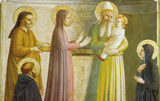
Angelico, fra, 1400-1455
Jean and Alexander Heard Libraries
Then Simeon blessed them and said to his mother Mary, “This child is destined for the falling and the rising of many in Israel, and to be a sign that will be opposed so that the inner thoughts of many will be revealed–and a sword will pierce your own soul too.”
There was also a prophet, Anna the daughter of Phanuel, of the tribe of Asher. She was of a great age, having lived with her husband seven years after her marriage, then as a widow to the age of eighty-four. She never left the temple but worshiped there with fasting and prayer night and day. At that moment she came, and began to praise God and to speak about the child to all who were looking for the redemption of Jerusalem.When they had finished everything required by the law of the Lord, they returned to Galilee, to their own town of Nazareth. The child grew and became strong, filled with wisdom; and the favor of God was upon him.
Sermon
Why did Luke put this week’s gospel reading into his book? Pastor Stevensen points out that this is history – an event in the life of Jesus. Besides being factual, a bible passage can also explain the purpose of an event. But what is Luke’s reason for telling it? The answer may be in the presence of two witnesses – Simeon and Anna. They say who Jesus is. They are credible witnesses. It had been revealed to righteous and devout Simeon by the Holy Spirit that before he died he would see the Christ. He took Jesus in his arms and praised God saying that He may dismiss his servant Simeon in peace for he had seen His salvation. The 84-year-old widow Anna who worshiped night and day at the temple spoke about Jesus to all looking for the redemption of Jerusalem. In our reading from Isaiah 61, the author in verse 10 says he has been clothed with garments of salvation and arrayed in a robe of righteousness. Who is talking? Is it Jesus Christ who would bring salvation? They must all be songs of God singing of the coming of Christ.


